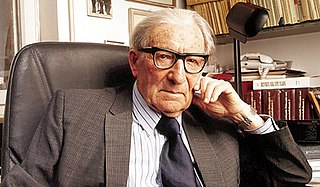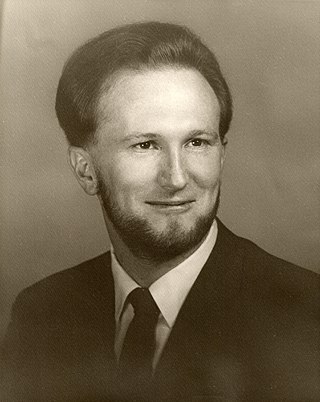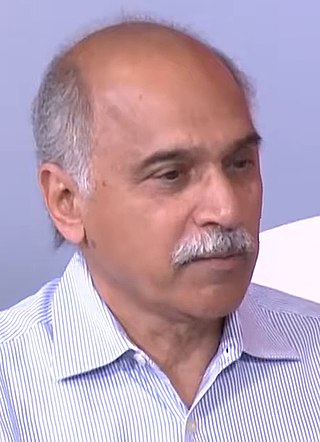Related Research Articles

Martin Charles Gutzwiller was a Swiss-American physicist, known for his work on field theory, quantum chaos, and complex systems. He spent most of his career at IBM Research, and was also an adjunct professor of physics at Yale University.

Leonard Susskind is an American theoretical physicist, Professor of theoretical physics in Stanford University and founding director of the Stanford Institute for Theoretical Physics. His research interests are string theory, quantum field theory, quantum statistical mechanics and quantum cosmology. He is a member of the US National Academy of Sciences, and the American Academy of Arts and Sciences, an associate member of the faculty of Canada's Perimeter Institute for Theoretical Physics, and a distinguished professor of the Korea Institute for Advanced Study.

George Whitelaw Mackey was an American mathematician known for his contributions to quantum logic, representation theory, and noncommutative geometry.

David Z. Albert is Frederick E. Woodbridge Professor of Philosophy and Director of the MA Program in The Philosophical Foundations of Physics at Columbia University in New York.

Gabriele Veneziano is an Italian theoretical physicist widely considered the father of string theory. He has conducted most of his scientific activities at CERN in Geneva, Switzerland, and held the Chair of Elementary Particles, Gravitation and Cosmology at the Collège de France in Paris from 2004 to 2013, until the age of retirement there.
Ahmet Turgay Uzer is a Turkish-born American theoretical physicist and nature photographer.

Yakir Aharonov is an Israeli physicist specializing in quantum physics. He has been a Professor of Theoretical Physics and the James J. Farley Professor of Natural Philosophy at Chapman University in California since 2008. He was a distinguished professor in the Perimeter Institute between 2009-2012 and is a professor emeritus at Tel Aviv University and at University of South Carolina. He is president of the IYAR, The Israeli Institute for Advanced Research.

Max Jammer, was an Israeli physicist and philosopher of physics. He was born in Berlin, Germany. He was Rector and Acting President at Bar-Ilan University from 1967 to 1977.
The Sackler Prize is named for the Sackler family and can indicate any of the following three awards established by Raymond Sackler and his wife Beverly Sackler currently bestowed by the Tel Aviv University. The Sackler family is known for its role in the opioid epidemic in the United States, has been the subject of numerous lawsuits and critical media coverage, and been dubbed the "most evil family in America", and "the worst drug dealers in history". The family has engaged in extensive efforts to promote the Sackler name, that has been characterized as reputation laundering. In 2023 the Sackler family's name was removed from the name of the Tel Aviv University Faculty of Medicine.
In mathematical physics, Gleason's theorem shows that the rule one uses to calculate probabilities in quantum physics, the Born rule, can be derived from the usual mathematical representation of measurements in quantum physics together with the assumption of non-contextuality. Andrew M. Gleason first proved the theorem in 1957, answering a question posed by George W. Mackey, an accomplishment that was historically significant for the role it played in showing that wide classes of hidden-variable theories are inconsistent with quantum physics. Multiple variations have been proven in the years since. Gleason's theorem is of particular importance for the field of quantum logic and its attempt to find a minimal set of mathematical axioms for quantum theory.

Eric Johnson "Rick" Heller is the Abbott and James Lawrence Professor of Chemistry and Professor of Physics at Harvard University. Heller is known for his work on time-dependent quantum mechanics, and also for producing digital art based on the results of his numerical calculations.

Seymour Michael Blinder is a professor emeritus of chemistry and physics at the University of Michigan, Ann Arbor and a remote working senior scientist with Wolfram Research in Champaign, Illinois.

Alwyn van der Merwe is an American theoretical physicist. He is Emeritus Professor of Physics in the Department of Physics and Astronomy, University of Denver.

Ramamurti Shankar is the Josiah Willard Gibbs professor of Physics at Yale University, in New Haven, Connecticut.
Jeffrey Bub is a physicist and philosopher of physics, and Distinguished Professor in the department of philosophy, the Joint Center for Quantum Information and Computer Science, and the Institute for Physical Science and Technology at the University of Maryland, College Park.
Israel Michael Sigal is a Canadian mathematician specializing in mathematical physics. He is a professor at the University of Toronto Department of Mathematics.
Ying-Cheng Lai is a Chinese theoretical physicist/electrical engineer who works in the field of chaos theory and complex dynamical systems. He is among the pioneers in the field of relativistic quantum chaos. Currently, he works at Arizona State University as a Regents Professor. He also holds an ISS Chair Professorship in Electrical Engineering.

Siegfried Grossmann is a German theoretical physicist who has been awarded the Max Planck Medal, the major prize for achievements in theoretical physics.

Paul Anthony Benioff was an American physicist who helped pioneer the field of quantum computing. Benioff was best known for his research in quantum information theory during the 1970s and 80s that demonstrated the theoretical possibility of quantum computers by describing the first quantum mechanical model of a computer. In this work, Benioff showed that a computer could operate under the laws of quantum mechanics by describing a Schrödinger equation description of Turing machines. Benioff's body of work in quantum information theory encompassed quantum computers, quantum robots, and the relationship between foundations in logic, math, and physics.
Paul Busch was a German-born mathematical physicist, known for his work in quantum mechanics. He made pioneering contributions to quantum measurement theory, being an advocate of the use of POVMs, and to the uncertainty principle in quantum mechanics, where he developed a mathematical formulation of a measurement-disturbance relation.
References
- ↑ "Outstanding Referees Program". American Physical Society . Retrieved 2010-11-14.
- W. C. Schieve, For Lawrence Horwitz on his sixty-fifth birthday. Foundations of Physics , Volume 26 (1996), Number 12, pp. 1575–1578